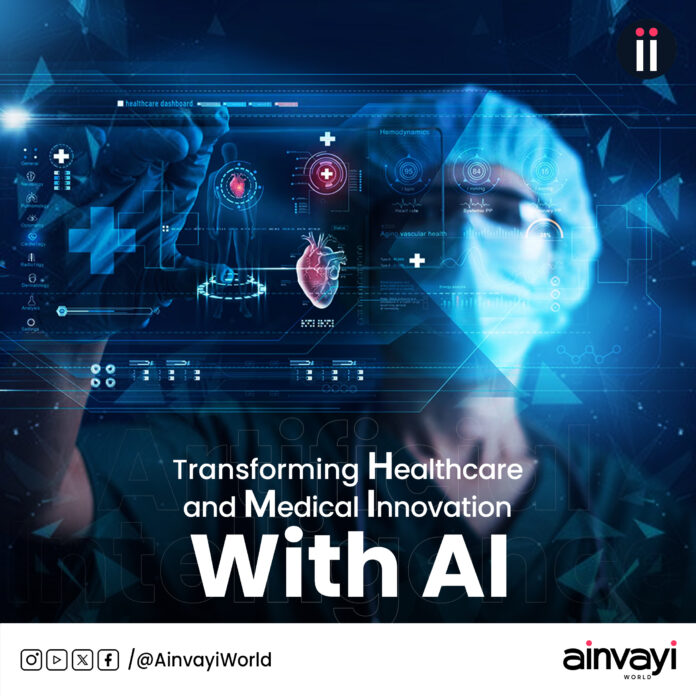Artificial Intelligence (AI) is revolutionizing various industries, with healthcare standing out as one of the most promising fields for its transformative potential. As we face increasing healthcare challenges, AI’s ability to process vast amounts of data and learn from it is helping medical professionals enhance diagnostics, personalize treatments, and improve patient care. Let’s explore the benefits of AI in healthcare, the cautions that must be taken into account, and the future possibilities it holds.
The Benefits
Enhanced Diagnostics and Early Detection
AI-powered algorithms can process medical images like X-rays, MRIs, and CT scans with high accuracy, often detecting abnormalities that the human eye may miss. Machine learning models analyze patterns in patient data, enabling early detection of diseases such as cancer, diabetes, and cardiovascular issues. This early intervention leads to timely treatment, potentially saving millions of lives.
Personalized Treatment
With AI, healthcare providers can offer personalized treatment plans based on a patient’s genetic makeup, medical history, and lifestyle. This approach is revolutionizing chronic disease management by predicting which therapies will be most effective. By customizing care, AI reduces trial-and-error prescriptions and promotes faster recovery.
Operational Efficiency
AI optimizes hospital administration by automating tasks such as scheduling, patient triage, resource management, and billing. This reduces inefficiencies, allowing healthcare professionals to focus more on patient care. For example, AI tools have successfully predicted patient influxes in emergency departments, ensuring that resources are appropriately allocated.
Drug Discovery and Development
AI is accelerating drug discovery by analyzing chemical compounds and predicting their efficacy. What once took years of research can now be shortened, helping pharmaceutical companies bring life-saving drugs to market faster. The rapid identification of drug candidates during the COVID-19 pandemic highlighted AI’s potential in global health emergencies, showcasing real-world impact.
Promoting Equitable Access to Healthcare
One of AI’s most exciting prospects is its ability to democratize healthcare. AI-powered telemedicine platforms and diagnostic tools can reach underserved regions with limited access to healthcare facilities. By offering virtual consultations, remote monitoring, and AI-assisted diagnostics, this technology helps bridge gaps in medical infrastructure, ensuring that people in remote areas receive timely care.
The Cautions
Data Privacy and Security
AI relies heavily on vast amounts of patient data, raising concerns about privacy and security. Healthcare institutions must ensure that AI systems comply with strict data protection laws. Robust cybersecurity measures are essential to protect sensitive patient information from breaches and misuse.
Bias in AI Algorithms
AI algorithms are only as good as the data they are trained on. If the dataset is not representative of the global population, AI could perpetuate healthcare inequalities, particularly among marginalized communities. To ensure fairness, AI systems must be developed using inclusive datasets that promote equitable healthcare access.
Replacing Human Judgment
While AI can aid in diagnostics and treatment recommendations, it cannot replace the intuition, empathy, and complex decision-making that medical professionals bring to patient care. Over-reliance on AI could lead to overlooking individual patient needs or unusual cases. Human oversight is crucial to ensure that AI enhances healthcare rather than diminishing the role of skilled practitioners.
Patient Passivity
There is a risk that AI could make patients feel sidelined in their healthcare journey. To combat this, AI systems must be designed to actively involve patients in their treatment plans, encouraging dialogue and shared decision-making. Tools that allow patients to track their health metrics, communicate with healthcare providers, and view what ails them can empower individuals to take an active role in their care.
Sustainability
For AI to be sustainable, it must integrate smoothly into existing healthcare frameworks without overwhelming them. The feasibility of integrating AI in the rural, tribal, and economically disadvantaged regions depends on infrastructure, training, and public awareness. While urban centers may be better equipped to adopt AI technologies, those regions require tailored solutions to bridge the technology gap. Continuous training for healthcare professionals on AI tools is crucial, ensuring that technology complements patient care. This includes regular updates and adaptability to evolving medical practices and needs.
Affordability & Accessibility
Medical infrastructure is often limited, particularly in rural, tribal, or economically disadvantaged regions. Implementing AI must consider technological barriers like internet access and device availability. Additionally, the cost of implementing AI technologies can be a significant barrier, particularly in countries where healthcare accessibility is already a concern. To prevent exacerbating existing inequalities, efforts must focus on developing affordable and accessible AI solutions.
AI Governance Frameworks
The implementation of AI in healthcare demands rigorous regulatory oversight to ensure transparency, reliability, and patient safety. Global health organizations, such as the WHO, emphasize the need for ethical frameworks to guide AI adoption. As AI advances, regulatory bodies must address issues like liability for AI-driven decisions, ensuring accountability and responsible deployment. Striking a balance between innovation and regulation is essential for safeguarding both patient welfare and technological progress in AI-based treatments.
The Future
AI’s role in healthcare is only set to expand. We are already witnessing glimpses of its potential:
AI-Assisted Surgery
AI can assist in surgeries by providing real-time data and guidance to surgeons, improving precision and minimizing risks while enhancing patient engagement.
Remote Patient Monitoring
Wearable devices powered by AI will monitor patients’ vital signs and health conditions in real time, alerting healthcare providers to potential issues before they escalate.
AI-Powered Virtual Health Assistants
Virtual assistants equipped with AI could offer 24/7 medical advice, appointment scheduling, and basic health monitoring, making healthcare more accessible, particularly in remote or underserved regions.
AI and Mental Health
AI-driven chatbots are already being used for cognitive behavioral therapy (CBT) in mental health, providing patients with immediate and personalized support. Future advancements could see AI playing a larger role in diagnosing and treating mental health conditions.
Revolutionizing Medical Training
AI has the potential to transform medical education by creating immersive training simulations that mimic real-life clinical scenarios. Virtual reality (VR) and augmented reality (AR) powered by AI can provide medical students and professionals with hands-on experience in a risk-free environment, enhancing their skills and confidence before they interact with real patients.
Conclusion
AI in healthcare represents an evolving frontier with the potential to transform patient care, diagnostics, and drug discovery. However, for its promise to be fully realized, we must address ethical concerns, ensure regulatory compliance, and promote equitable access. Prioritizing patient involvement in AI integration will create an empowering healthcare experience. By harnessing both human expertise and AI innovation, we can usher in a new era where medical care is smarter, faster, and more accessible to all.




